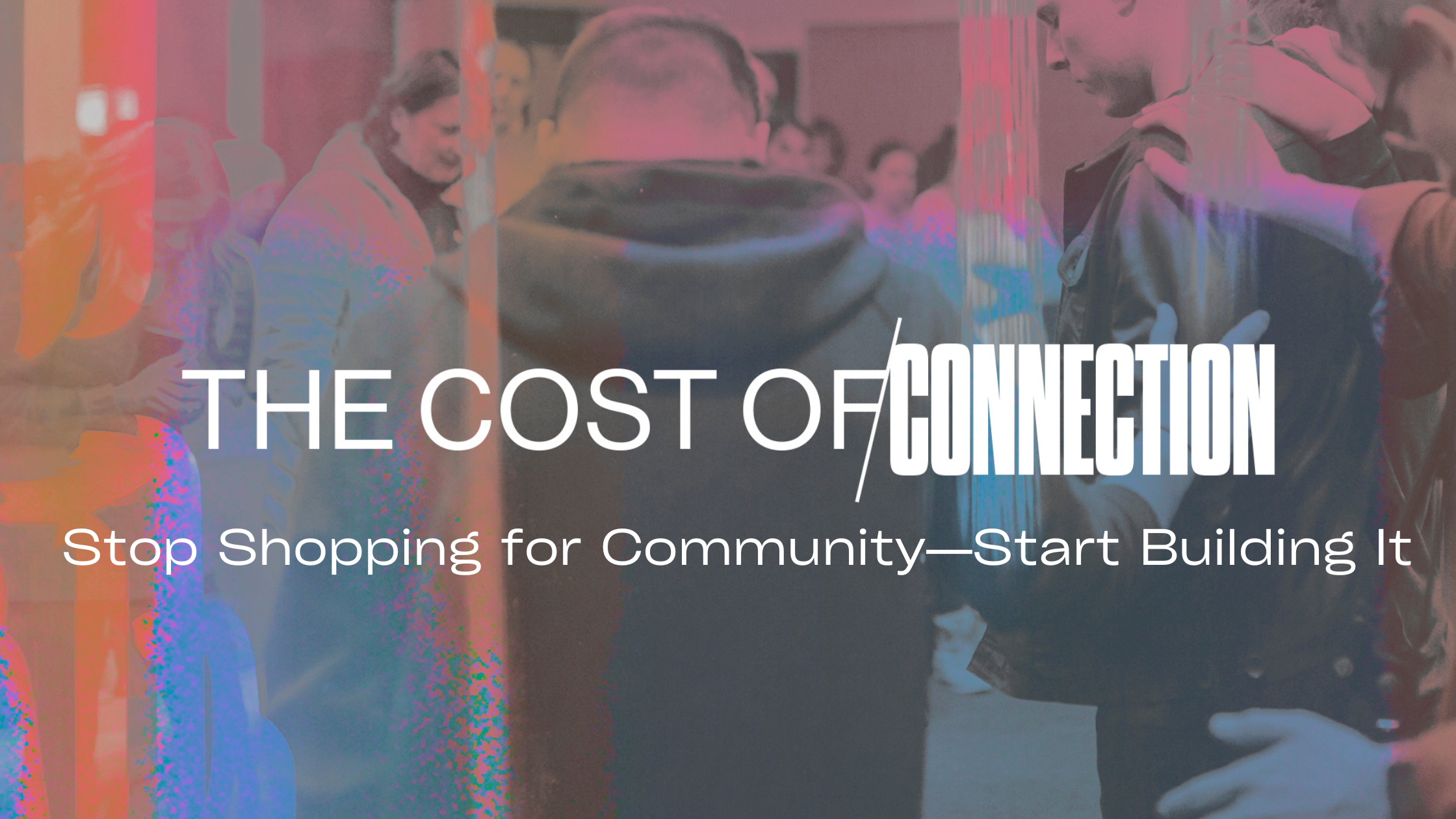The Cost Of Connection: Stop Shopping for Community—Start Building It
Let me start with a question:
What’s the last thing you really shopped for?
I don’t mean something you casually browsed or window-shopped—I mean something you did the research on, counted the cost, and really considered if it was worth it.
We all know what it’s like to shop. We weigh value, time, effort, and investment. We want the best return with the least sacrifice. But here’s the thing: that mindset doesn’t work in community. Not the kind of community God calls us to.
From Shopping to Building
Shopping is about me—my preferences, my options, my benefit. But building is about us. It’s rooted in commitment, transformation, and trust.
In American culture, we’re taught to shop for everything—products, experiences, even relationships. So when we feel a deep need for connection, we naturally approach it like consumers. We shop for the “perfect” friend, the upgraded church, or the ideal small group. But true biblical community isn’t found that way. It’s built.
The early church in Acts didn’t shop for community. They sacrificed for it. They invested in it. They built it. Their lives weren’t about optimizing outcomes—they were about transformation. And that’s what God invites us into too.
A Mindset Shift
Hebrews 10:23–25 says:
“Let us hold tightly without wavering to the hope we affirm, for God can be trusted to keep His promise. Let us think of ways to motivate one another to acts of love and good works. And let us not neglect our meeting together… but encourage one another, especially now that the day of his return is drawing near.”
Notice the call: hold tightly. Motivate each other. Meet together. Encourage one another.
Community isn’t passive. It’s active, intentional, and transformative. And it’s not just for us—it’s for others, too. When we build community, we’re helping others meet Jesus, grow in faith, and live transformed lives.
What’s Your Mindset Toward Community?
Let’s be honest. Sometimes we treat small groups or church events like our Amazon carts—filled with “saved for later” items. We pencil things into our calendars but hold off on actually showing up. We’re still “counting the cost,” deciding if it’s worth it.
But when we’re building, it’s different. Builders show up. Builders commit. Builders invest—even when it’s inconvenient or uncomfortable—because they know the outcome is worth the cost.
And guess what? God is building something big—something that includes you. It might be a lifelong community or a short, specific season of growth. But either way, He’s inviting you to partner with Him.
Two Ways to Build: Leadership & Participation
1. Leadership
In God’s community, leadership isn’t about being on a pedestal—it’s about layers. In Exodus 18, Moses’ father-in-law Jethro encouraged him to appoint leaders over groups of thousands, hundreds, fifties, and tens. Why? Because no one person can carry the burden alone. Leadership is meant to be shared.
Later in Acts, when the Greek-speaking widows were being overlooked in the food distribution, the disciples didn’t dismiss the concern—they delegated. They empowered new leaders to care for people in meaningful, tangible ways.
In God’s design, leadership is more common than we think, and you might be called into it. Leading doesn’t always mean leading a whole group. It might mean leading a conversation, a prayer, or a moment of vulnerability. You don’t have to be perfect—just willing.
2. Participation
Not everyone is called to lead, but everyone is called to participate.
We’ve all been there: showing up to a group or event and wondering, “Do I fit in here?” That’s the shopping mindset talking. But when we’re building, our participation isn’t based on comfort—it’s based on commitment to what God is doing.
Participation might look like:
- Answering a question
- Praying for someone
- Consistently showing up
- Listening well
- Offering encouragement
You don’t have to do everything. But you do have to do something.
Josh’s Story: From Conviction to Community
Take my husband Josh, for example—a leader in our men’s ministry. His journey didn’t start with a title. It started with a conviction to connect with godly men. He prayed what he called a “dangerous prayer,” asking God to help him build meaningful relationships. And within days, God answered—an invitation to play guitar at a men’s breakfast led him to deeper community, accountability, and eventually leadership.
Was it easy? No. It cost him comfort, time, vulnerability, and even babysitter money. But five years later, the community that formed has been there through adoptions, family struggles, celebrations, and spiritual growth. Josh didn’t shop for community. He built it.
What’s Your Next Step?
So here’s the big question for you:
How are you going to build?
- Maybe it’s fully engaging in your current group with a builder’s mindset.
- Maybe it’s joining a new group with a commitment to participate.
- Maybe it’s stepping into leadership—even if it’s just leading a prayer or hosting a gathering.
- Maybe it’s starting a brand-new group because the one you’re looking for doesn’t exist yet.
Final Word: Don’t Build Alone
We don’t build in our own strength. We build because we’re partnering with a God who is actively working in and through His people. Whether you’re stepping into leadership, participation, or something new entirely—know this: you’re not alone.
So ask yourself this week:
Am I shopping? Or am I building?
Let’s be a people who invest deeply, love sacrificially, and build communities that point people to Jesus.


